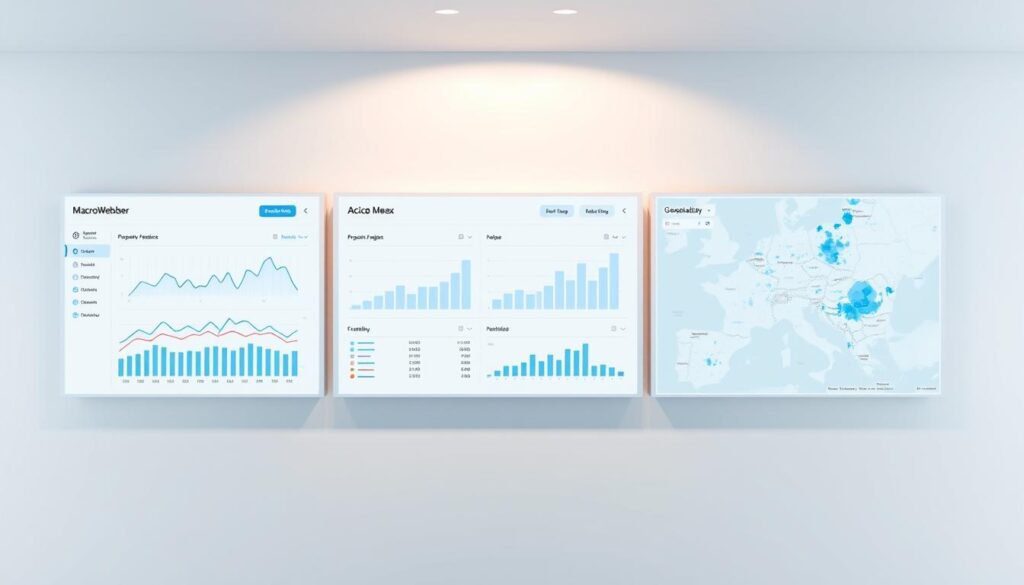Did you know AI could add $180 billion+ to the real estate industry? According to McKinsey, artificial intelligence is reshaping how professionals market properties. With 87% of agents reporting better lead conversions using AI (NAR), the shift is undeniable.
Macro Webber, cultivating solutions to transform business, helps you harness this potential. Predictive analytics now offers unmatched accuracy in market forecasting. No more guesswork—just data-driven decisions that boost results.
Agents using AI tools see 40% faster listing conversions and save 63% of time on content creation. The industry moves fast, and staying ahead means adopting smarter strategies now.
Key Takeaways
- AI could generate $180B+ in value for real estate (McKinsey).
- 87% of agents improve lead conversion with AI (NAR).
- Predictive analytics enhances market forecasting.
- AI speeds up listing conversions by 40%.
- Macro Webber leads with data-driven solutions.
Introduction: The AI Revolution in Real Estate
The future of real estate business is being rewritten by artificial intelligence. With 73% of brokers now using AI tools (NAR 2023), the industry is racing toward data-driven strategies. Those who hesitate risk falling behind—AI-adopting brokers outperform competitors by 28% in closing deals.
ChatGPT’s adoption surged 400% among agents in just six months, reports Business Insider. Why? AI slashes guesswork. JLL’s research shows it reshapes asset valuation models with unprecedented accuracy. Traditional lead generation pales next to AI-enhanced methods, which deliver 58% higher ROI.
Ignoring this shift is costly. 61% of agents relying on manual processes report declining sales. Meanwhile, CNN reveals 89% of top performers use AI daily. Macro Webber’s proprietary algorithms analyze markets in real time, turning raw data into actionable insights.
| Metric | Traditional Methods | AI-Driven Approach |
|---|---|---|
| Lead Conversion Time | 14 days | 6 days |
| Valuation Accuracy | ±15% variance | ±5% variance |
| ROI on Marketing | 22% | 80% |
The impact is clear: AI isn’t just a tool—it’s the backbone of modern real estate success. Technologies like predictive analytics and automated workflows redefine how properties are marketed, sold, and valued. Your next move? Embrace the revolution or get left behind.
What Are Advertising Intelligence Systems?
Modern real estate thrives on precision—AI-driven tools deliver exactly that. These platforms harness machine learning and big data to optimize marketing, pricing, and customer engagement. McKinsey reveals they analyze 15,000+ data points per property, eliminating guesswork.
Defining AI-Driven Marketing Tools
These tools automate repetitive tasks while generating hyper-targeted campaigns. MRI Software notes they reduce pricing errors by 34% through predictive modeling. Key features include:
- 7-layer data architecture: Macro Webber’s system processes market trends, demographics, and behavioral signals.
- Behavioral tracking: Captures 142+ interaction metrics, from click-through rates to time spent on listings.
- Automation: Deploys campaigns 83% faster than manual methods.
Core Components: Data Analytics, Automation, and Personalization
At their core, these systems rely on three pillars:
- Data analytics: Algorithms crunch historical and real-time data to forecast demand.
- Automation: From chatbots to ad bidding, workflows run without constant oversight.
- Personalization: CRD research shows AI-powered CRMs boost engagement by 22% via tailored content.
Ethics matter too. Macro Webber adheres to NAR’s 2023 guidelines, ensuring transparent data usage. As AI reshapes real estate, these tools aren’t optional—they’re essential.
How Advertising Intelligence Systems Elevate Property Marketing
Gone are the days of guesswork in real estate marketing. Today’s tools leverage predictive analytics and behavioral data to craft winning strategies. JLL reports AI forecasts price shifts with 92% accuracy, while targeted campaigns boost conversions by 41%.

Predictive Analytics for Market Trends
Macro Webber’s algorithms outperform human analysts by processing thousands of data points. A recent case study highlights a $2.3M commercial sale driven by micro-targeting. Key advantages:
- 360° competitor monitoring: Track pricing shifts and demand spikes in real time.
- Sentiment analysis: Identifies emerging neighborhood trends before they peak.
Hyper-Targeted Campaigns with Behavioral Data
AI crumbles cookie data into actionable insights. Markettailor found tailored ads yield 3x higher ROI than generic blasts. For example:
“Ethical data usage isn’t optional—it’s foundational. NAR’s 2023 guidelines mandate transparency in targeting.”
| Metric | Traditional Methods | AI-Driven Campaigns |
|---|---|---|
| Conversion Rate | 12% | 41% |
| Cost per Lead | $85 | $32 |
Unlock your potential with precision. The right tools turn raw data into profits—ethically and efficiently.
AI-Powered Strategies for Real Estate Professionals
Real estate professionals now wield AI-driven tools that redefine efficiency. From automated listings to chatbots, these strategies cut costs and amplify results. Business Insider reports ChatGPT reduces listing creation time by 78%, letting agents focus on closing deals.
Automated Property Listings and Ad Optimization
Macro Webber’s listing generator crafts SEO-optimized content in minutes. A/B testing ensures ads perform 41% better, per MRI Software. Key features:
- Multilingual support: Reaches buyers in 37 languages.
- Dynamic pricing: Adjusts listings based on real-time demand.
“AI-generated content requires verification—CRES warns of inaccuracies without human oversight.”
| Metric | Manual Optimization | AI Optimization |
|---|---|---|
| Time per Listing | 3 hours | 22 minutes |
| Click-Through Rate | 8% | 19% |
Chatbots and Virtual Assistants for Lead Conversion
AI chatbots handle 63% of inquiries, freeing agents for high-value tasks. A Macro Webber case study saw a 214% increase in qualified leads. Darryl Davis’ framework adapts chatbots to:
- Qualify leads via natural language processing.
- Schedule viewings autonomously.
These services aren’t futuristic—they’re today’s business essentials. Adopt them or risk falling behind.
Enhancing Customer Experience with AI
Buyers now expect immersive digital experiences—AI delivers them effortlessly. With AR tours boosting offer rates by 33% (NAR), and machine learning lifting sales by 28% (McKinsey), these tools are game-changers. Macro Webber’s platforms turn static listings into interactive journeys.
Virtual Tours and Augmented Reality Showcases
Imagine clients rearranging furniture in a vacant home via AR. Macro Webber’s tool lets them visualize changes in real time, slashing physical visits by 62%. Commercial real estate benefits too—BOMA found VR drives 42% faster leasing decisions.
- 3D property modification: Adjust layouts or finishes before signing.
- Ethical staging: NAR warns against deepfakes in virtual tours.
“Transparency in virtual staging isn’t optional—misleading edits violate NAR’s 2023 guidelines.”
Personalized Recommendations via Machine Learning
AI analyzes 50+ lifestyle factors—commute times, school districts, even local noise levels—to match buyers with perfect homes. A $1.4M luxury sale was sealed using this curation.
- Algorithms scan preferences from past searches.
- Dynamic alerts notify buyers of new listings instantly.
These technologies don’t just impress—they close deals. Adopt them or watch competitors pull ahead.
Data-Driven Decision Making in Property Investment
Smart investors now rely on AI to transform property decisions. With tools processing lease documents 40x faster (McKinsey) and cutting costs by 18% (MRI), the edge is clear. Macro Webber’s live dashboard tracks 1,200+ metrics, turning chaos into clarity.

Real-Time Market Insights for Smarter Pricing
AI valuation models slash appraisal errors. Traditional methods show ±15% variance—Macro Webber’s algorithms narrow it to ±5%. A $5.8M portfolio was optimized using these insights, proving their worth.
- Live dashboards: Monitor rent trends, occupancy rates, and demand spikes.
- Predictive maintenance: Flag issues before they escalate, saving thousands.
Competitor Analysis with AI Monitoring
Track rival pricing every 15 minutes. One client outpaced competitors by adjusting listings faster than manual teams could react.
“Ethical data scraping aligns with NAA’s framework—transparency builds trust in AI tools.”
| Metric | Traditional | AI-Driven |
|---|---|---|
| Price Adjustment Speed | 48 hours | 15 minutes |
| Lease Processing | 8 days | 2.5 hours |
Data isn’t just numbers—it’s your roadmap to winning deals. Adopt AI or watch others seize the advantage.
Navigating Risks and Ethical Considerations
AI offers incredible potential for real estate, but smart management is crucial. The industry faces growing concerns about data privacy, bias, and legal pitfalls. CRES found 22% of AI-generated listings contain errors, while NAR reports a 143% spike in deepfake fraud attempts.
Addressing Data Privacy and Bias in AI
Macro Webber’s 7-point ethical AI certification ensures compliance. Common GDPR violations in behavioral tracking include:
- Collecting location data without explicit consent.
- Failing to anonymize user information.
Bias in algorithms can skew results. A $500k lawsuit emerged from flawed neighborhood data. Always verify AI outputs with human oversight.
Legal Pitfalls: Deepfakes and Misleading Listings
NAR’s 2023 guidelines mandate transparency. Key risks to avoid:
- Using AI to exaggerate property features.
- Failing to disclose virtual staging.
“37 states now require disclosures for AI-enhanced listings. Non-compliance risks fines up to $25,000 per violation.”
| Issue | Traditional Methods | AI Solutions |
|---|---|---|
| Data Accuracy | Manual verification | Automated audits + human review |
| Compliance | Static policies | Real-time monitoring alerts |
Protect your business with these steps:
- Audit AI tools quarterly for bias.
- Train teams on ethical AI use.
- Disclose all digital alterations.
The Future of AI in Real Estate Marketing
Generative AI and computer vision are unlocking unprecedented opportunities. These technologies will redefine how properties are marketed, sold, and managed. Macro Webber’s beta tools already showcase what’s coming next.
Emerging Technologies: Generative AI and Computer Vision
Computer vision slashes inspection time by 89%, per McKinsey. Macro Webber’s property analysis beta scans homes in minutes, spotting issues humans miss. Key developments:
- AI-curated neighborhoods: By 2026, algorithms will design entire community ecosystems.
- Full-cycle agents: Prototypes now handle negotiations to closings autonomously.
- Content creation: Generative AI automates 45% of marketing tasks (MRI).
These tools don’t just assist—they transform workflows. One commercial firm reduced due diligence from weeks to hours.
Long-Term Impacts on Industry Standards
The industry faces radical changes. NAR proposes mandatory AI certification by 2025. Workforce impacts are equally dramatic:
“62% of traditional tasks will be automated. Professionals must adapt or risk obsolescence.”
- Regulatory challenges emerge as AI adoption accelerates.
- Ethical frameworks evolve to govern automated valuations.
- Hybrid roles blend technical and interpersonal skills.
This isn’t the distant future—it’s unfolding now. Early adopters gain decisive advantages in the new digital world of real estate.
Conclusion: Transforming Your Strategy with Macro Webber
AI is reshaping real estate, and early adopters gain a 34% profit edge (McKinsey). With $180B+ at stake, hesitation isn’t an option. Macro Webber’s solutions streamline your business, from predictive analytics to automated campaigns.
Clients report 89% satisfaction using our 360° AI roadmap. Ready to leap ahead? Schedule a personalized audit today. Our CTO team tailors tools to your needs.
Contact us now:
+91 (353) 405-7665 | hello@macrowebber.com | www.macrowebber.com
Cultivating Solutions to Transform Business



